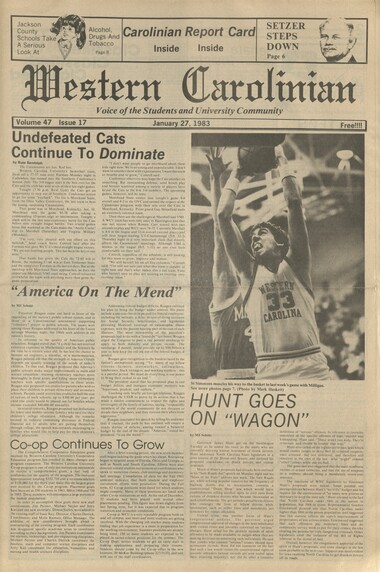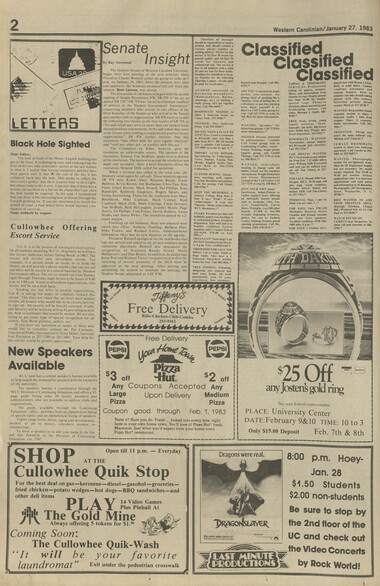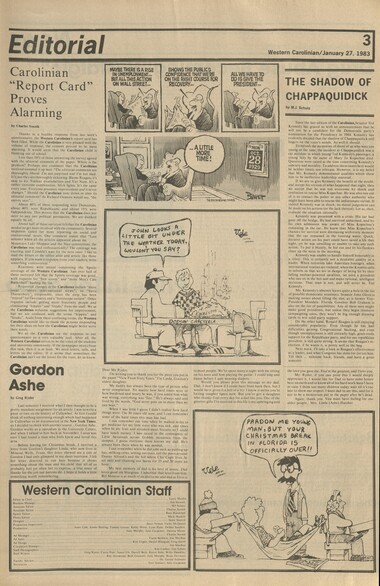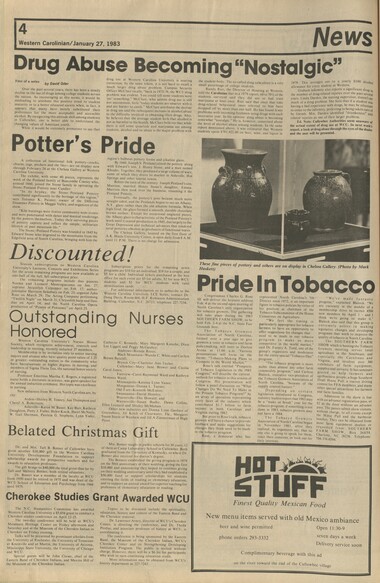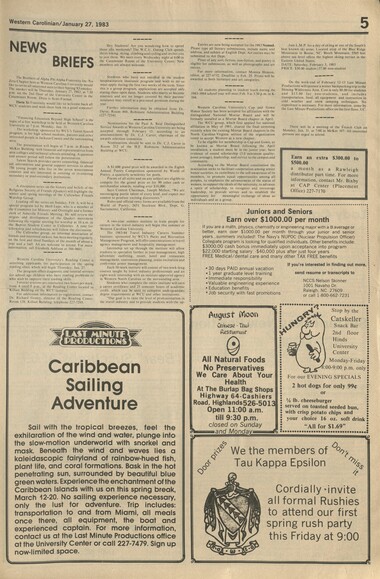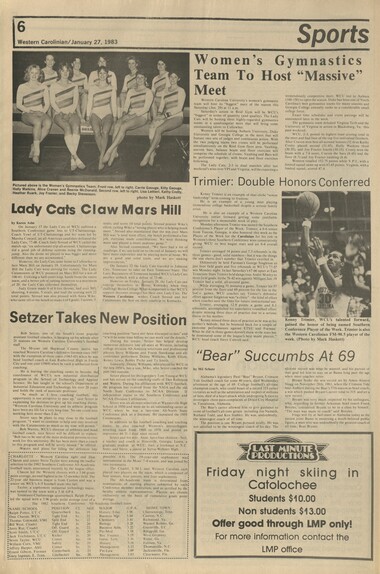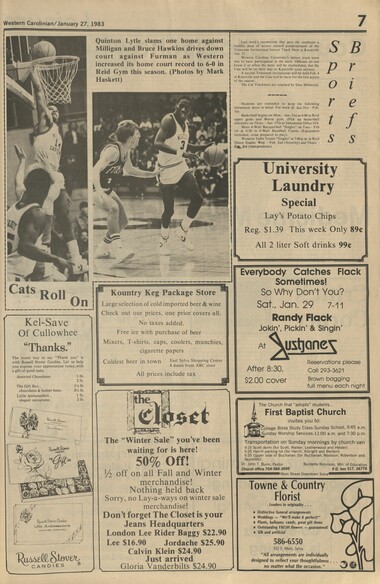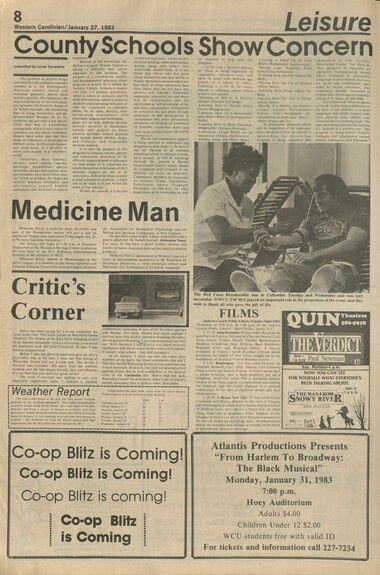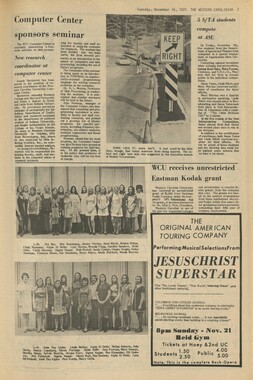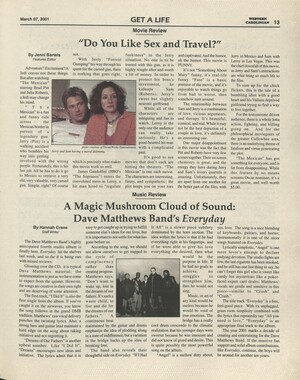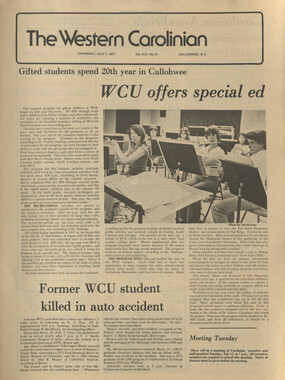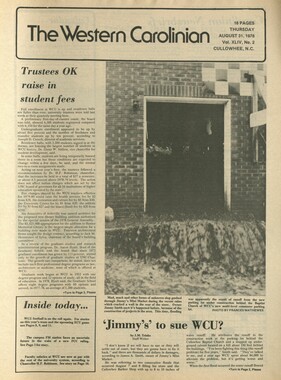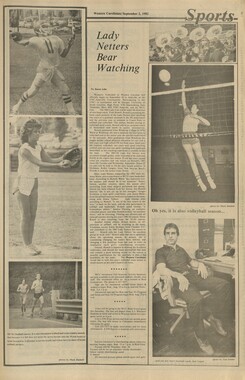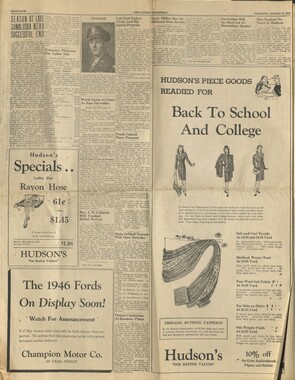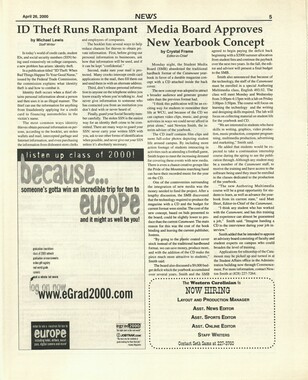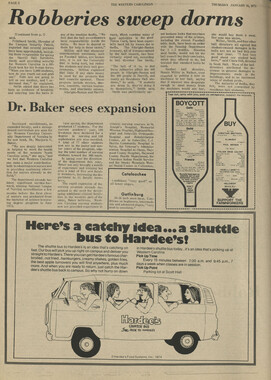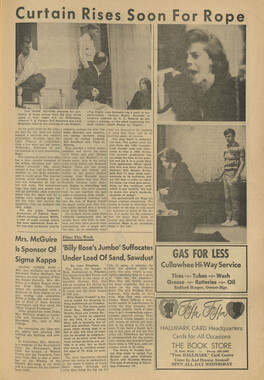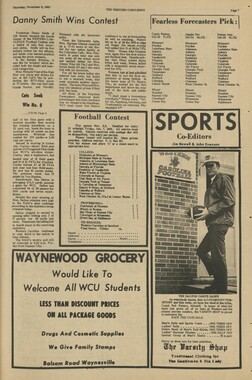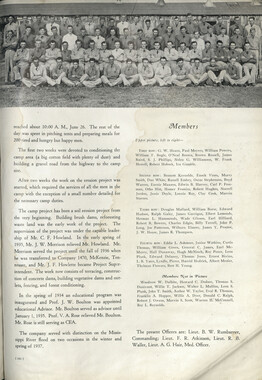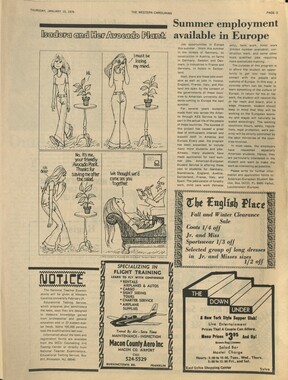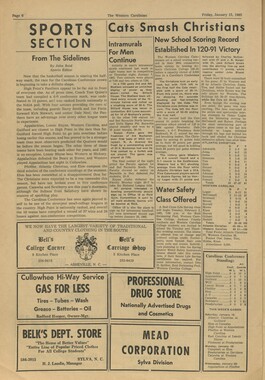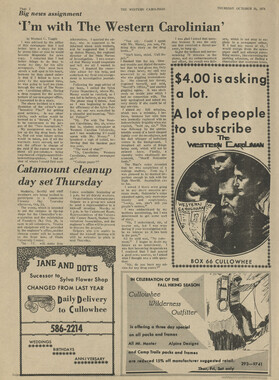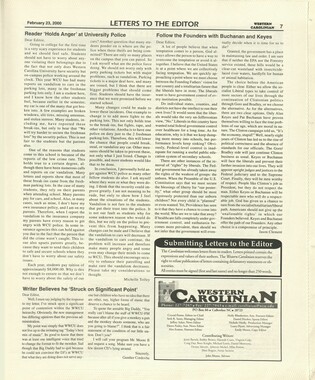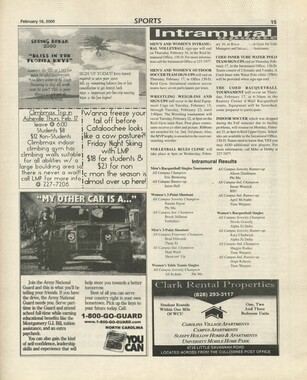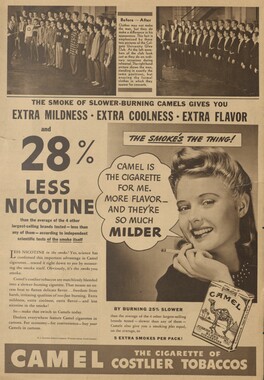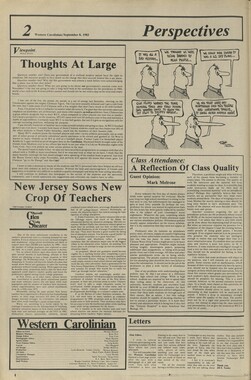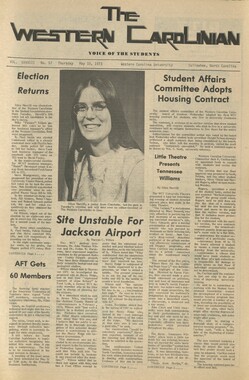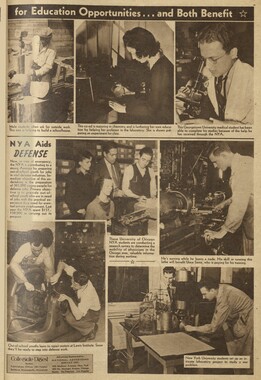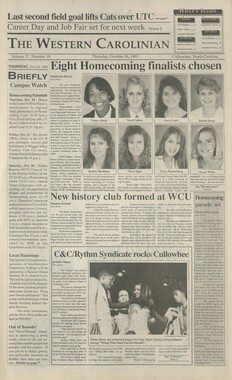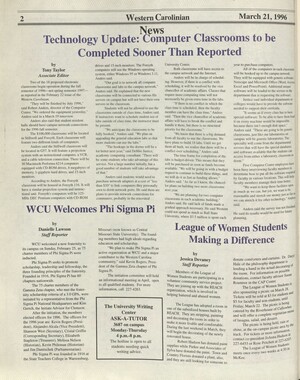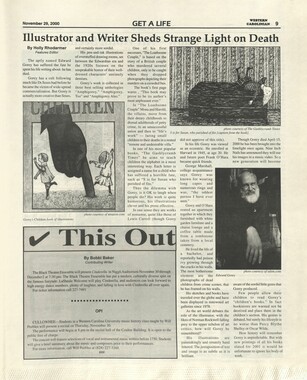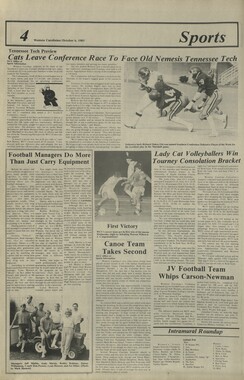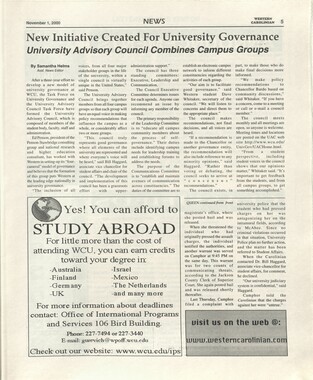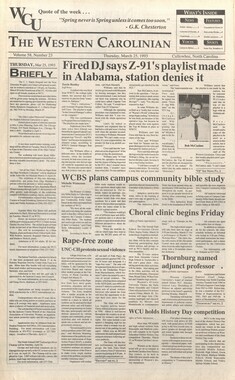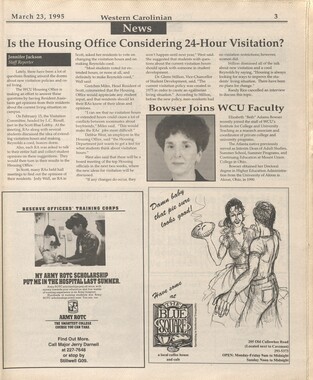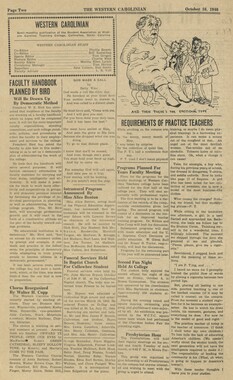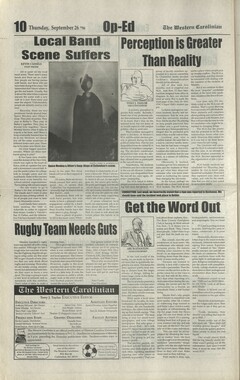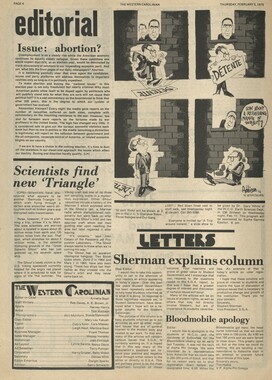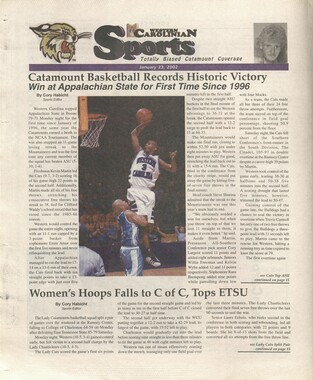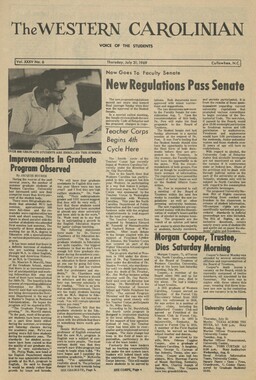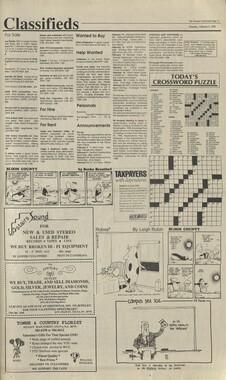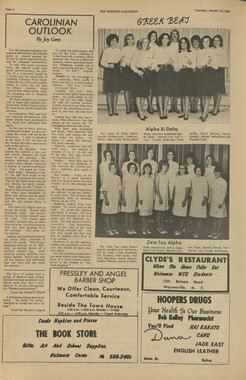Western Carolina University (20)
View all
- Canton Champion Fibre Company (2308)
- Cherokee Traditions (293)
- Civil War in Southern Appalachia (165)
- Craft Revival (1942)
- Great Smoky Mountains - A Park for America (2767)
- Highlights from Western Carolina University (430)
- Horace Kephart (941)
- Journeys Through Jackson (154)
- LGBTQIA+ Archive of Jackson County (19)
- Oral Histories of Western North Carolina (314)
- Picturing Appalachia (6679)
- Stories of Mountain Folk (413)
- Travel Western North Carolina (160)
- Western Carolina University Fine Art Museum Vitreograph Collection (129)
- Western Carolina University Herbarium (92)
- Western Carolina University: Making Memories (708)
- Western Carolina University Publications (2283)
- Western Carolina University Restricted Electronic Theses and Dissertations (146)
- Western North Carolina Regional Maps (71)
- World War II in Southern Appalachia (131)
University of North Carolina Asheville (6)
View all
- Allanstand Cottage Industries (62)
- Appalachian National Park Association (53)
- Bennett, Kelly, 1890-1974 (1295)
- Berry, Walter (76)
- Brasstown Carvers (40)
- Carver, George Washington, 1864?-1943 (26)
- Cathey, Joseph, 1803-1874 (1)
- Champion Fibre Company (233)
- Champion Paper and Fibre Company (297)
- Cherokee Indian Fair Association (16)
- Cherokee Language Program (22)
- Crowe, Amanda (40)
- Edmonston, Thomas Benton, 1842-1907 (7)
- Ensley, A. L. (Abraham Lincoln), 1865-1948 (275)
- Fromer, Irving Rhodes, 1913-1994 (70)
- George Butz (BFS 1907) (46)
- Goodrich, Frances Louisa (120)
- Grant, George Alexander, 1891-1964 (96)
- Heard, Marian Gladys (60)
- Kephart, Calvin, 1883-1969 (15)
- Kephart, Horace, 1862-1931 (313)
- Kephart, Laura, 1862-1954 (39)
- Laney, Gideon Thomas, 1889-1976 (439)
- Masa, George, 1881-1933 (61)
- McElhinney, William Julian, 1896-1953 (44)
- Niggli, Josephina, 1910-1983 (10)
- North Carolina Park Commission (105)
- Osborne, Kezia Stradley (9)
- Owens, Samuel Robert, 1918-1995 (11)
- Penland Weavers and Potters (36)
- Roberts, Vivienne (15)
- Roth, Albert, 1890-1974 (142)
- Schenck, Carl Alwin, 1868-1955 (1)
- Sherrill's Photography Studio (2565)
- Southern Highland Handicraft Guild (127)
- Southern Highlanders, Inc. (71)
- Stalcup, Jesse Bryson (46)
- Stearns, I. K. (213)
- Thompson, James Edward, 1880-1976 (226)
- United States. Indian Arts and Crafts Board (130)
- USFS (683)
- Vance, Zebulon Baird, 1830-1894 (1)
- Weaver, Zebulon, 1872-1948 (58)
- Western Carolina College (230)
- Western Carolina Teachers College (282)
- Western Carolina University (1794)
- Western Carolina University. Mountain Heritage Center (18)
- Whitman, Walt, 1819-1892 (10)
- Wilburn, Hiram Coleman, 1880-1967 (73)
- Williams, Isadora (3)
- Cain, Doreyl Ammons (0)
- Crittenden, Lorraine (0)
- Rhodes, Judy (0)
- Smith, Edward Clark (0)
- Appalachian Region, Southern (2393)
- Asheville (N.C.) (1886)
- Avery County (N.C.) (26)
- Blount County (Tenn.) (161)
- Buncombe County (N.C.) (1664)
- Cherokee County (N.C.) (283)
- Clay County (N.C.) (555)
- Graham County (N.C.) (233)
- Great Smoky Mountains National Park (N.C. and Tenn.) (478)
- Haywood County (N.C.) (3522)
- Henderson County (N.C.) (70)
- Jackson County (N.C.) (4692)
- Knox County (Tenn.) (25)
- Knoxville (Tenn.) (12)
- Lake Santeetlah (N.C.) (10)
- Macon County (N.C.) (420)
- Madison County (N.C.) (211)
- McDowell County (N.C.) (39)
- Mitchell County (N.C.) (132)
- Polk County (N.C.) (35)
- Qualla Boundary (981)
- Rutherford County (N.C.) (76)
- Swain County (N.C.) (2020)
- Transylvania County (N.C.) (247)
- Watauga County (N.C.) (12)
- Waynesville (N.C.) (68)
- Yancey County (N.C.) (72)
- Aerial Photographs (3)
- Aerial Views (60)
- Albums (books) (4)
- Articles (1)
- Artifacts (object Genre) (228)
- Biography (general Genre) (2)
- Cards (information Artifacts) (38)
- Clippings (information Artifacts) (191)
- Crafts (art Genres) (622)
- Depictions (visual Works) (21)
- Design Drawings (1)
- Drawings (visual Works) (184)
- Envelopes (73)
- Facsimiles (reproductions) (1)
- Fiction (general Genre) (4)
- Financial Records (12)
- Fliers (printed Matter) (67)
- Glass Plate Negatives (381)
- Guidebooks (2)
- Internegatives (10)
- Interviews (811)
- Land Surveys (102)
- Letters (correspondence) (1013)
- Manuscripts (documents) (619)
- Maps (documents) (159)
- Memorandums (25)
- Minutes (administrative Records) (59)
- Negatives (photographs) (5735)
- Newsletters (1285)
- Newspapers (2)
- Occupation Currency (1)
- Paintings (visual Works) (1)
- Pen And Ink Drawings (1)
- Periodicals (193)
- Personal Narratives (7)
- Photographs (12982)
- Plans (maps) (1)
- Poetry (5)
- Portraits (1657)
- Postcards (329)
- Programs (documents) (151)
- Publications (documents) (2237)
- Questionnaires (65)
- Scrapbooks (282)
- Sheet Music (1)
- Slides (photographs) (402)
- Sound Recordings (796)
- Specimens (92)
- Speeches (documents) (15)
- Tintypes (photographs) (8)
- Transcripts (322)
- Video Recordings (physical Artifacts) (23)
- Vitreographs (129)
- Text Messages (0)
- A.L. Ensley Collection (275)
- Appalachian Industrial School Records (7)
- Appalachian National Park Association Records (336)
- Axley-Meroney Collection (2)
- Bayard Wootten Photograph Collection (20)
- Bethel Rural Community Organization Collection (7)
- Blumer Collection (5)
- C.W. Slagle Collection (20)
- Canton Area Historical Museum (2110)
- Carlos C. Campbell Collection (282)
- Cataloochee History Project (65)
- Cherokee Studies Collection (4)
- Daisy Dame Photograph Album (5)
- Daniel Boone VI Collection (1)
- Doris Ulmann Photograph Collection (112)
- Elizabeth H. Lasley Collection (1)
- Elizabeth Woolworth Szold Fleharty Collection (4)
- Frank Fry Collection (95)
- George Masa Collection (173)
- Gideon Laney Collection (452)
- Hazel Scarborough Collection (2)
- Hiram C. Wilburn Papers (28)
- Historic Photographs Collection (236)
- Horace Kephart Collection (861)
- Humbard Collection (33)
- Hunter and Weaver Families Collection (1)
- I. D. Blumenthal Collection (4)
- Isadora Williams Collection (4)
- Jesse Bryson Stalcup Collection (47)
- Jim Thompson Collection (224)
- John B. Battle Collection (7)
- John C. Campbell Folk School Records (80)
- John Parris Collection (6)
- Judaculla Rock project (2)
- Kelly Bennett Collection (1314)
- Love Family Papers (11)
- Major Wiley Parris Civil War Letters (3)
- Map Collection (12)
- McFee-Misemer Civil War Letters (34)
- Mountain Heritage Center Collection (4)
- Norburn - Robertson - Thomson Families Collection (44)
- Pauline Hood Collection (7)
- Pre-Guild Collection (2)
- Qualla Arts and Crafts Mutual Collection (12)
- R.A. Romanes Collection (681)
- Rosser H. Taylor Collection (1)
- Samuel Robert Owens Collection (94)
- Sara Madison Collection (144)
- Sherrill Studio Photo Collection (2558)
- Smoky Mountains Hiking Club Collection (616)
- Stories of Mountain Folk - Radio Programs (374)
- The Reporter, Western Carolina University (510)
- Venoy and Elizabeth Reed Collection (16)
- WCU Gender and Sexuality Oral History Project (32)
- WCU Mountain Heritage Center Oral Histories (25)
- WCU Oral History Collection - Mountain People, Mountain Lives (71)
- WCU Students Newspapers Collection (1744)
- Western North Carolina Tomorrow Black Oral History Project (69)
- William Williams Stringfield Collection (2)
- Zebulon Weaver Collection (109)
- African Americans (388)
- Appalachian Trail (35)
- Artisans (521)
- Cherokee art (84)
- Cherokee artists -- North Carolina (10)
- Cherokee language (21)
- Cherokee pottery (101)
- Cherokee women (208)
- Church buildings (166)
- Civilian Conservation Corps (U.S.) (110)
- College student newspapers and periodicals (1830)
- Dams (95)
- Dance (1023)
- Education (222)
- Floods (60)
- Folk music (1015)
- Forced removal, 1813-1903 (2)
- Forest conservation (220)
- Forests and forestry (917)
- Gender nonconformity (4)
- Great Smoky Mountains National Park (N.C. and Tenn.) (154)
- Hunting (38)
- Landscape photography (10)
- Logging (103)
- Maps (84)
- Mines and mineral resources (8)
- North Carolina -- Maps (18)
- Paper industry (38)
- Postcards (255)
- Pottery (135)
- Railroad trains (69)
- Rural electrification -- North Carolina, Western (3)
- School integration -- Southern States (2)
- Segregation -- North Carolina, Western (5)
- Slavery (5)
- Sports (452)
- Storytelling (245)
- Waterfalls -- Great Smoky Mountains (N.C. and Tenn.) (66)
- Weaving -- Appalachian Region, Southern (280)
- Wood-carving -- Appalachian Region, Southern (328)
- World War, 1939-1945 (173)
Western Carolinian Volume 47 Number 17
Item
Item’s are ‘child’ level descriptions to ‘parent’ objects, (e.g. one page of a whole book).
-
-
Jackson County I Schools Take A Serious Look At Alcohol, Drugs And Tobacco Page 8 Carolinian Report Card Inside Inside SETZER STEPS DOWN Page 6 £simt Carflitman Voice of the Students and University Community \ Volume 47 Issue 17 January 27, 1983 Free!!!! I Undefeated Cats Continue To Dominate by Russ Randolph The Catamounts are hot. Red hot. Western Carolina University's basketball team, fresh off a 77-57 rout over Furman Monday night in Cullowhee, has turned into the Southern Conference's hottest club. The 3-0 league start is the best ever for the Cats and the club has won seven of their last eight games. Tonight (7:30 p.m. Reid Gym) the Cats get an opportunity to step out of Southern Conference action to go for some "payback". The foe is Morehead State, from the Ohio Valley Conference, the last team to beat the young, surprising Catamounts. That game was in Morehead, Kentucky, Jan. 10. Morehead won the game 93-78 after taking a commanding 15-point edge at intermission. Tonight a clash will be the last non-conference battle for the Cats before nine straight league battles. Two crucial games loom this weekend as the Cats make the "Arctic Circle" trip to Marshall (Saturday) and Virginia Military (Monday). "I'm very, very pleased with our effort on this ballclub," head coach Steve Cottrell said after the Furman win gave WCU it's third straight league victory. "We are out-hustling people. This has been the key to our wins." That hustle has given the Cats the 72-65 win at Boone, the stunning 67-66 win at East Tennessee State and the romp over Furman in the last ten days. But as the matchup with Morehead State approaches, as does the important Marshall/ VM1 road swing, Cottrell refuses to overwhelm the team with anything more than game-by- game preparation. "1 don't want people to go overboard about these kids right now. We Ye so young and unpredictable. I don't want to smother them with expectations. I want this team to breathe and to grow," Cottrell said. Conference observers may hope the Cats smother on something. But outstanding defense, solid bench play and heroics scattered among a variety of players have keyed the Cats to the 8-4, 3-0 numbers. The upcoming games, however, will be tests. Morehead State comes into tonight's game 9-6 overall and 4-2 in the OVCand earned the respect of the Catamount program with their win over the Cats in Morehead, Kentucky. Point guard Guy Minnifield leads an extremely talented team. Then there are the challenges at Marshall and VM1. A WCU team has won only once in Huntington and that was last season when Ronnie Carr scored with two seconds to play and WCU won 74-72. Currently Marshall is 4-0 in the league and 11-4 overall (second place) and will host league-leading UT-Chattanooga (5-0, 12-2) Thursday night in a very important clash that directly affects the Catamounts' standings. Although VM1 is winless in the league (0-5, 1-11) no one ever feels comfortable on their turf. Cottrell, regardless of the schedule, is still looking for this team to grow, improve and mature. "We still haven't hit on all five cylinders," Cottrell said. "I'm still not sure just what this team is capable of right now and that's what makes this a fun team. Fans who haven't seen us play are missing an exciting- very exciting- team." "A merica On The Mend" by MJ Schutz President Reagan came out hard in favor of the upgrading of the nation's public school system, and in favor of a Constitutional amendment supporting "voluntary" prayer in public schools. The issues were among those Reagan addressed in his State of the Union message Monday night, the 196th such address in the nation's history. In reference to the quality of American public education, Reagan stated that "if a child has not received extensive exposure to Mathematics and the Sciences by the time he is sixteen years old, he has lost the chance to become an engineer, a scientist, or a mathematician. Reagan pointed out that the strength of America's future depends on quality training of the minds of today's children. To that end, Reagan proposed that America's public schools make major improvements in math and science education—training elementary teachers more thoroughly in these areas, and hiring more elementary teachers with specific qualifications in these areas. Reagan also proposed tax credits for parents who wish to place their children in private elementary and secondary schools. Parents could receive tax credits for half the cost of tuition of such schools, up to $300.00 per year, per child (the credit would be phased out for families whose income exceeded $40,000.00 annually). In related remarks, Reagan proposed tax deductions for lower and middle-income families who save for their children's college education. Although the remarks seemed to indicate continuing decreases in Federal financial aid to adults who are putting themselves through college, the speech was certainly encouraging to families who would like to help pay for their children's college educations. Addressing federal budget deficits, Reagan outlined his plan to bring the budget under control. His plans include a one-year freeze in payroll for federal employees, including the military, a delay in cost-of-living increases for Social Security beneficiaries, and legislation providing Medicare coverage of catastrophic illness expenses, with the patient bearing part of the cost of such illnesses. The most noteworthy of the president's proposals had to do with a "stand-by" tax boost. Reagan urged the Congress to pass a one percent surcharge to apply to both industry and private income. The surcharge, if passed, could provide up to $50 billion a year to help keep the red ink out of ihe federal budget, if needed. Reagan gave recognition to the burdens faced by the nation's unemployed, saying, "To many of our fellow citizens — farmers, steelworkers, autoworkers, lumbermen, black teenagers, and working mothers—this is a painful period. We must do everything in our power to bring their ordeal to an end." The president stated that his proposed plan to end budget deficits and instigate economic recovery was "bipartisan, prudent, and realistic." Touching only briefly on foreign relations, Reagan challenged the USSR to prove by its actions that it has made a sincere commitment to respect the rights and sovereignty of the family of nations, saying, "responsible members of the world community do not threaten or invade their neighbors, and they restrain their allies from aggression." Reagan concluded his speech by telling his audience that if enacted, the path he has outlined will ensure a steady decline of deficits, aiming toward a balanced budget by the end of the decade. "America," stated her president, "is on the mend." Co-op Continues To Grow The Comprehensive Cooperative Education grant received by Western Carolina University's Cooperative Education program has resulted in many changes and program expansion. The Western Carolina University Co-op program is one of only ten institutions nationwide to receive a comprehensive grant, a real vote of confidence for the quality of the program. The two-year appropriation totaling $352,718 and a recommendation of $136,000 for the third year make this the largest grant ever received by the Co-op program. Placement goals have been set at 250 students in 1983, 500 in 1984 and 750 in 1985. These numbers will encompass a large portion of the student population. In order to accomplish these goals three new staff coordinators, Jim Painter, Michael Naylor and Jerry Kiel and one new secretary, Donna Surles, were added to the existing staff of Susie Ray, Director; Charles Derrick, Coordinator; and Mylie Ramsey, Office Manager. The addition of new coordinators brought about a restructuring of the existing program. Each coordinator was designated specific academic areas to coordinate according to their backgrounds. Jim Painter coordinates tne sciences, technology, and pre-enginecringdisciplines. Michael Naylor and Charles Derrick coordinate the business, math and computer science disciplines and Jerry Kiel coordinate the education, humanities and nursing and health sciences disciplines. After a brief training period, the new seven member staff began tackling the goals which lay ahead. Recruiting began in targeted areas of Florida, Ohio, and Georgia as well as North and South Carolina. Efforts were also directed toward student recruitment as coordinators who speak to numerous classes, club meetings and dormitory hall meetings. Compilation of data for the Fall 1982 semester indicates that both student and employer recruitment efforts were productive. During the Fall term, 82 Co-op positions were listed for which students might compete. Many of these positions are listed with other Co-op institutions as well. At the end of December, 32 students had been placed with several other placements pending. This figure was down slightly from last Spring term, but it was expected due to program transition and economic conditions. Co-op at WCU is a very reputable program both on and off campus, and more and more students are getting involved. With the changing job market many students finding that job experience is a must in preparation for the working environment. Summer positio'ns are already being listed. 150 or more students are expected to be placed in career-related positions for the summer. The Co-op Dept. invites students to get an early start in making applications and preparing their resume. Students should come by the Co-op office in the new location, 20 McKee Building (phone 227-7133), and talk with one of the staff coordinators. Si Simmons muscles his way to the basket in last week's game with Milligan. See more photos page 7. (Photo by Mark Haskett) HUNT GOES ON "WAGON" by MJ Schutz Governor James Hunt got on the bandwagon Tuesday as he added his voice to the many who are currently decrying lenient treatment of drunk drivers. Hunt addressed North Carolina State legislators in a joint session of the House and Senate, and outlined his proposed crackdown on drunk drivers and violent criminals. Much of Hunt's proposals had already been outlined in his "Safe Roads Act"speech on Monday night and his "State of the State" address last week. I he Sale Roads act, while echoing popular concern for the frequency of highway deaths due to intoxication, contains a controversial "Dram Shop" law which would leave establishments selling alcohol open to civil suits from victims of drunken drivers who became intoxicated at such establishments. The act includes penalties to drivers who endanger 'the lives of fellow drivers while intoxicated, such as stiffer tines and mandatory jail sentences for repeat offenders. Violent crime was another focus of Hunt's congressional address. The governor urged congressional approval of changes in the laws which deal with violent crime and juveniles convicted on "serious" •charges. Hunt called for the juvenile records of adult offenders to be made available to judges when they arc- making decisions on sentencing such individuals. He said that youths who commit "serious" crimes should have permanent records. Hunt did not comment on the fact that such a law would violate the constitutional rights of juvenile offenders (whose records arc now scaled upon their attaining majority), nor did he oiler a tentative definition of "serious" offenses. In reference to juveniles convicted of the specific offenses of rape, murder and kidnapping. Hunt said. "These aren't just kids. They're criminals and should be treated that way." Hunt also called on the legislators to pass laws which would enable judges to deny bail to criminal suspects, once arrested but not convicted, and therefore still innocent in the eyes of the law who "might" commit "other" crimes while out on bail. The governor also suggested that the state reimburse victims of armed robberies, and that the use of weapons in a robbery should bring a mandatory seven-year sentence. The reactions of WNC legislators to Governor Hunt's proposals were mixed. Some pointed out incongruences between Hunt's "no frills" budget and his request for the construction of %>as many new prisons as necessary to keep the state safe." Hunt referred tothe fact that North Carolina ranks 10th in the nation in population, but 39th in crime. Representative Gordon Greenwood pointed out that North Carolina ranks higher than 10th in the prison population and suggested that this statistic reflects the state's imprisonment of perpetrators of less serious crimes. Greenwood suggested that such offenders pay monetary fines and do community service work to pay for their crimes, thereby clearing the prisons for truly dangerous criminals. Other legislators cited the violation of the Bill of Rights inherent in the denial of bail. Overall, however, the congressmen approved of the spirit of Hunt's proposals, and some changes in the law seem probable in the next year. Support was most evident for laws enabling North Carolina to get drunken drivers off its roads.
Object
Object’s are ‘parent’ level descriptions to ‘children’ items, (e.g. a book with pages).
-
The Western Carolinian is Western Carolina University's student-run newspaper. The paper was published as the Cullowhee Yodel from 1924 to 1931 before changing its name to The Western Carolinian in 1933.
-
